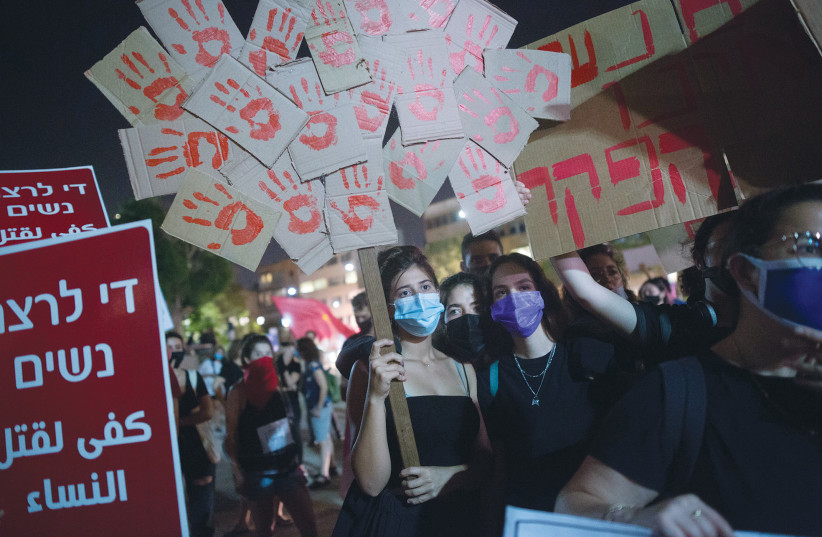The resources available for victims of domestic abuse and how those resources are used can differ greatly depending on the social group of the victim, a new study published on August 9 has found.
The peer-reviewed study, which is published in the academic journal Frontiers in Sociology, collected quantitative data from 357 Jewish women and 439 Arab women living in Israel.
The study aimed to understand the different ways Arab women and Jewish women accessed help in escaping abusive relationships, and which sources of help were available to the groups.
Domestic abuse in Israel
The study defined domestic abuse, while relabelling it as “intimate partner violence”, as “behavior that occurs in a current or previous intimate relationship, which causes physical, psychological, or sexual harm.”
While studies have already been undertaken to understand the amount of domestic abuse in different communities in Israel, this study is one of the first to look at the help available to victims of different communities. The study believes that much like how domestic abuse exists differently for sociological reasons, so do the actions of survivors of abuse.

In Israel, Arab women are at the highest risk of becoming victims of domestic abuse, as shown by a study in 2021 that found 67% of the female Arab population have been victimized by domestic abusers. The 2021 survey also found that female immigrants to Israel were at a slightly higher risk of experiencing domestic abuse (30%) than Israelis born in Israel (27%).
The study explains that while more Arab women are working outside the home, the patriarchal culture within Arab society remains and that presence is especially apparent within romantic relationships. The study justifies this claim by using the phenomena of honor killings in Arab society in Israel to explain the ways in which women are abused for reasons relating to intimacy and sexuality.
The difference in help seeking tendencies for victims of domestic abuse
The study supported the pre-established belief that victims of domestic abuse seek help after three phases have been completed. Firstly, the victim needs to identify the abuse as abuse. Second, the victim needs to make the decision to seek help. Finally, the victim needs to determine who to approach for help. However, each phase exists within a theoretical framework and each victim considers the phase within their own understanding of normativity and social contexts.

Under the theory of help-seeking behavior, and intersectional approach to understanding why some victims seek aid, victims of abuse first consider things in the context of their socio-cultural contextual influences. In this phase, many victims may not even realize that they are being abused because the norms within their relationship are standard across their social group. In the second stage, victims consider their beliefs and lived experiences under established social support connections. Finally, the victim seeks a sense of agency, which empowers them to take control and seek help.
As previously mentioned, the study describes Arab society within Israel as a patriarchal one. Previous research has already established that within patriarchal societies, “women are expected to retain their honor by remaining hidden and maintaining a low profile, restricting their autonomy, and abiding by various constraints to uphold their reputation and that of their family.”
Adding to the issues faced by all victims of domestic abuse, Arab women face the additional difficulty of navigating their abuse as a minority ethnic group within the wider context of the Israeli-Palestinian conflict. This may mean that Arab women face additional barriers in accessing sources provided by the Israeli state or language barriers.
So Arab women are in the unique position of reluctance to seek help from within Arab society for fear of damaging the image of their family and facing barriers to accessing support from official sources.
Carrying out the study on victims of domestic abuse
In total 796 women participated in the study, 55.2% of whom were Arab. The participants were aged 18-75 years old with different relationship statuses and levels of religiosity.
The study confirmed that Jewish Israeli women were more likely to seek help than Arab Israeli women.
Just under 30% of both Jewish and Arab women said that there was a high probability that they would turn to their father for help. For Jewish women, 15.7% said that there was a high probability that they would turn to their mothers, while only 13.3% of Arab women said the same. 19.6% of Jewish women said they would be highly likely to turn to a sibling, while only 14.6% of Arab women said the same.
62.7% of Jewish women said that they would be highly likely to turn to a friend for help, while only 32.3% of Arab women felt the same.
19.9% of Jewish women said they would be highly likely to ask a teacher for help, while Arab women had a higher probability of 24.4%. Maintaining this trend of reporting to officials, 37.3% of Jewish women said they would likely tell a social worker, while 41.7% of Arab women said the same. Additionally, only 17.4% of Jewish women said they would be highly likely to tell a religious leader while 27.8% of Arab women said that they would.
54.3% of Jewish women said that they would be highly likely to turn to a social organization for help, while the number stood at only 36.5% for Arab women.
The data ultimately revealed that Arab women are less likely to approach their family and friends for help, while they were more likely to contact professionals excluding social organizations.
The study also found vastly different trends depending on the age of the Arab or Jewish victim. Young Arab women were significantly more likely to seek help than older Arab women while the same was true for Jewish women in reverse. Older Jewish women were more likely to seek help than younger ones.
Additionally, for Jewish women, the level of religiosity didn’t impact how likely they would be to seek help. However, religious Arab women were less likely to seek help than their more secular counterparts.
In theorizing the reasoning behind some of the statistics, the researchers explained that neither group was likely to seek help from their mothers because “they do not perceive the mothers as having sufficient social power to help them.”
